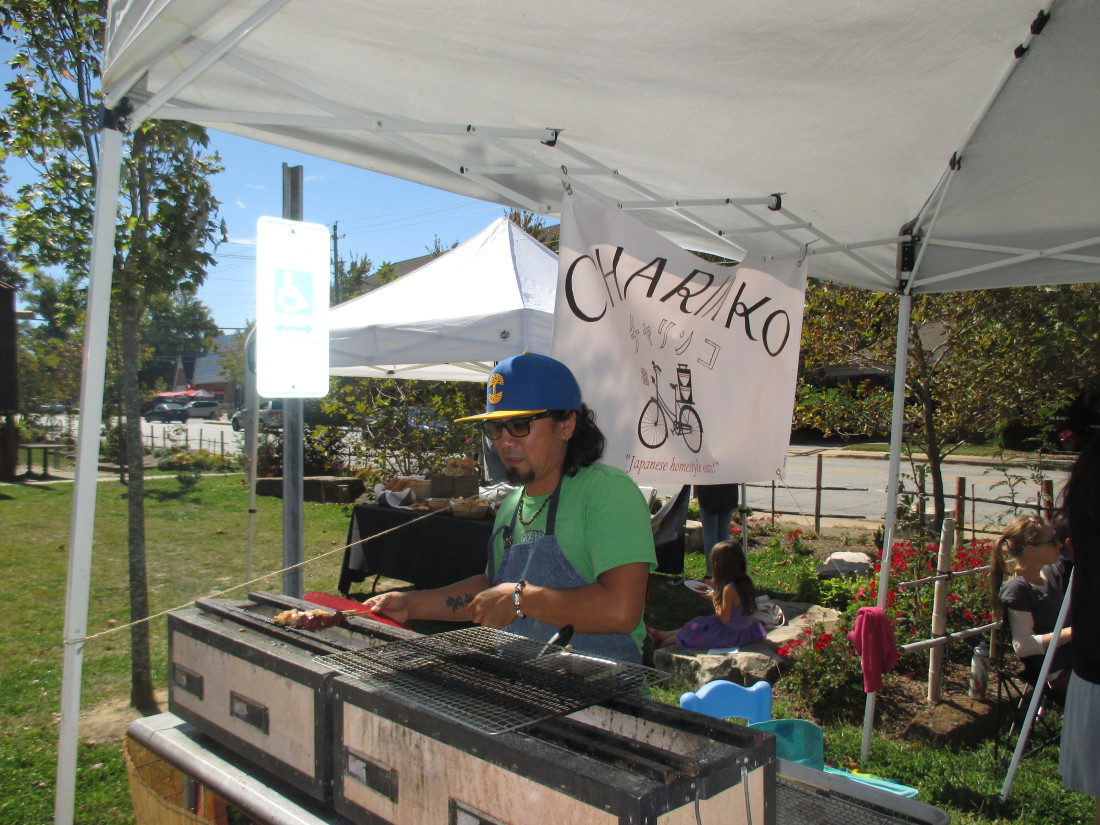You may think you’ve had authentic Japanese cuisine, but according to chef Khan Kogure of Charinko, chances are you haven’t. Kogure, who recently relocated to Asheville from Bellingham, Wash., is giving Asheville residents a taste of real Japanese izakaya cuisine at his run of monthly pop-up dinners at Gan Shan Station.
Mountain Xpress: What does Charinko mean?
Khan Kogure: I’m a cyclist. Charinko is Japanese for bicycle.
How did you find your way to Asheville? What’s your culinary background?
My brother moved here in 2006. I was living in Bellingham, Wash., at the time. I had been there for about three years — I went because of a girl. My brother enticed me to move here in 2010 and wanted to open an izakaya [Japanese gastropub]. I came, and we looked at some places, but circumstances changed for my brother. He was raising a family, and opening a restaurant was just too risky. I ended up going back to the West Coast and working for a childhood friend’s catering company, Peko Peko. That friend then opened Izakaya Rintaro, one of San Francisco’s hottest new Japanese restaurants. I thought I needed years of training in Japan for that type of food, but he said, ‘No, you can do it.’ Before I worked for him, I had about 10 years of kitchen experience but never cooked Japanese. I helped him design the menu and the kitchen. After that, I returned to Asheville.
What is izakaya cuisine?
In Japan, izakayas are informal neighborhood establishments where people gather after work for small plates — kind of like Japanese tapas. It includes a little bit of everything, things like yakitori [grilled chicken] and pickled salads.
Tell me about these pop-up dinners you’re doing at Gan Shan Station. When was the first one?
The first was in April of this year. I was back for a visit to Asheville, but I was ready to move again. I was getting depressed about how cold people were in California and so techie. I wanted to come back. I always remembered the hospitality in Asheville — the warmness, the kindness. I was visiting my brother and his family, and thought I could do a pop-up while here just to get my name out there. I got connected to Patrick [O’Cain] at Gan Shan Station, and my sister-in-law helped me to promote the pop-up. Patrick was receptive right away. He looked up Rintaro in San Francisco and was like, ‘Yeah.’ The first few have been very successful. Right now, I take over the restaurant the last Sunday of the month. Gan Shan West opens in a few weeks, and the plan is to take over there every Sunday. The menu features six small plates of homestyle, casual Japanese eats, and sake and beer options are also available. [Editor’s note: Gan Shan West opened on Haywood Road on Nov. 2.]
What was on the September menu?
Organic chicken thighs and onion skewers with tare [sweet, soy-based sauce] glaze; some pickled salads; curried potato croquettes; local trout that was cured, air-dried and grilled, and local ground pork with miso.
What’s one of the most unusual ingredients you use?
Katsuobushi — dried bonito flakes — very smoky. We’ve sourced it out from a small town in Kagoshima, Japan.
Does your girlfriend work with you?
Yes. She has another job, but she works with me a lot. She’s kind of the backbone to what I do. She’s amazing. It’s pretty funny. I’m full-blooded Japanese and always wanted to meet a nice Japanese girl. You’d think that would have been easy in the Bay Area in California, but I had to come to Asheville, and she was literally the girl next door. Go figure — there are about 35 Japanese people in Asheville!
What are your future plans?
Eventually, I’d like to get something like a hot dog cart and travel around town with a grill — pitch a tent with a few tables, etc. It’s street food to a certain extent, but in order to do izakaya, you have to do it a certain way. Asheville is funny — people want what they want, but I have to have my boundaries. I need to keep this food authentic. I won’t let people say, ‘I want this instead of that on my chicken. For example, I only use certain sauces on certain cuts of meat and skewers. It’s the essence of what the food is, and if you do it once, you have to do it again. I want to give people an education about what Japanese food is. Simplicity is important to me. I want to test the waters and see what happens. For now, brick-and-mortar is out of the question.
Anything else you want to share?
I want people to come out and try my food.




Before you comment
The comments section is here to provide a platform for civil dialogue on the issues we face together as a local community. Xpress is committed to offering this platform for all voices, but when the tone of the discussion gets nasty or strays off topic, we believe many people choose not to participate. Xpress editors are determined to moderate comments to ensure a constructive interchange is maintained. All comments judged not to be in keeping with the spirit of civil discourse will be removed and repeat violators will be banned. See here for our terms of service. Thank you for being part of this effort to promote respectful discussion.